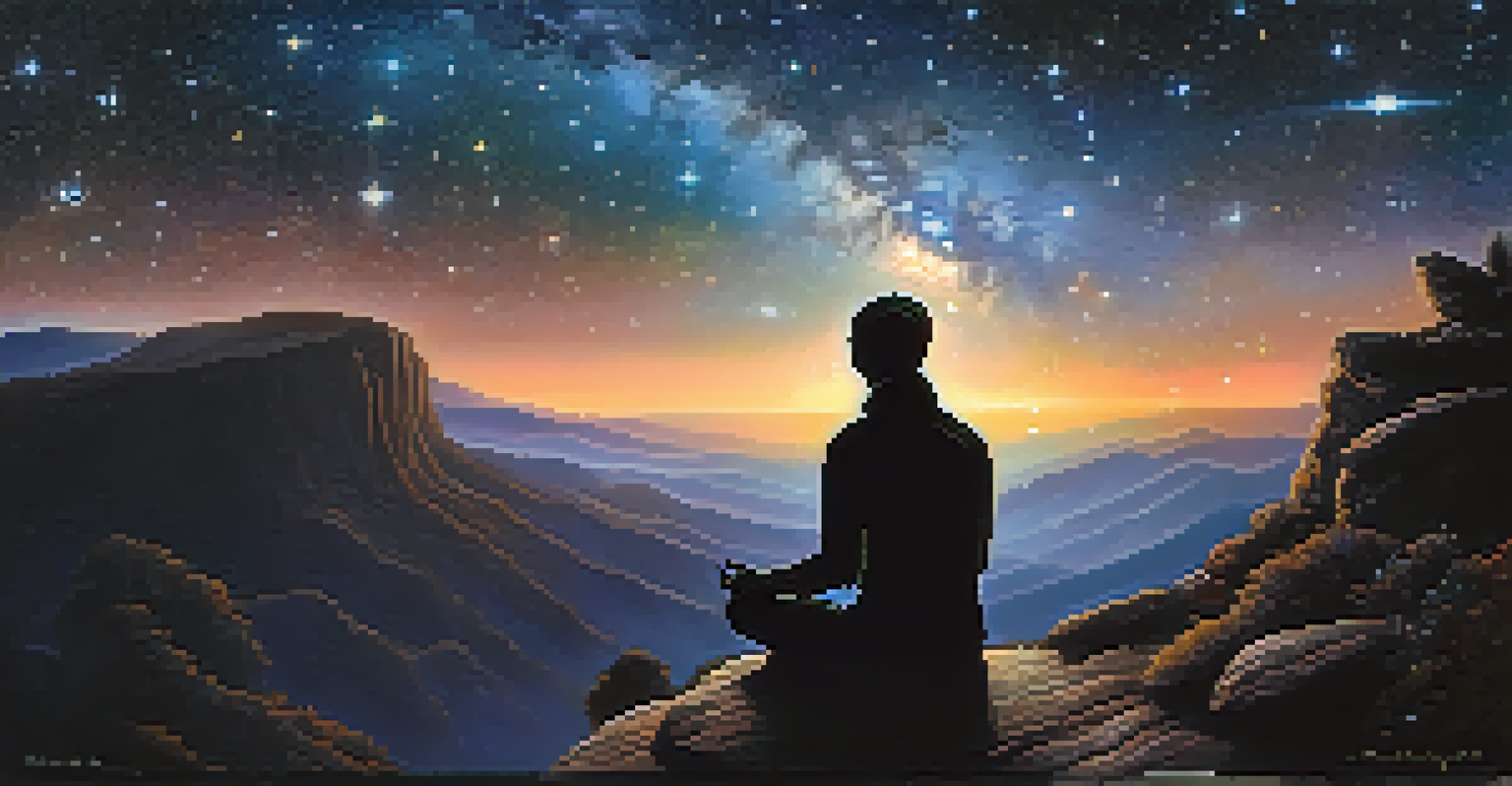Spirituality in the Modern Scientific Paradigm: A Review

Understanding Spirituality in Today's Context
Spirituality has evolved significantly, especially in our fast-paced world. It often emphasizes personal growth, connection, and understanding, rather than strictly adhering to religious doctrines. This shift allows individuals to explore their beliefs more freely, often alongside scientific perspectives, creating a richer tapestry of understanding.
Science without religion is lame, religion without science is blind.
Many people are now seeking spirituality that resonates with their experiences and scientific explanations of the universe. For instance, meditation practices, which have roots in spirituality, are increasingly being backed by scientific studies demonstrating their benefits for mental health and well-being. This blending of the spiritual with the scientific encourages a holistic approach to understanding our existence.
Furthermore, the modern scientific paradigm invites questions about consciousness and the universe that spirituality often addresses. By acknowledging the mysteries of life, individuals can engage in a dialogue that respects both spiritual insights and scientific discoveries, paving the way for a more integrated worldview.
The Role of Science in Spiritual Exploration
Science plays a critical role in our understanding of spirituality, providing frameworks to explore profound questions. Neuroscience, for example, looks at how spiritual practices affect brain activity, leading to discoveries about mindfulness and its positive effects on mental health. This intersection sheds light on how and why spiritual practices may enhance our overall well-being.

Moreover, quantum physics introduces concepts that challenge our conventional understanding of reality, mirroring spiritual philosophies. The idea that everything is interconnected resonates with both quantum entanglement and many spiritual teachings, suggesting that science and spirituality can enrich one another. This synergy inspires individuals to delve deeper into both realms.
Spirituality Embraces Science
The integration of spirituality and science fosters a richer understanding of existence, allowing for personal growth and exploration.
As scientific knowledge progresses, it allows spirituality to adapt and evolve. Rather than seeing science as a threat to spirituality, many are finding it a valuable ally that can provide evidence and insights into spiritual experiences, ultimately fostering a more comprehensive understanding of our existence.
Bridging the Gap: Science and Spirituality
Historically, science and spirituality have often been viewed as opposing forces. However, a growing number of thinkers advocate for a more integrative approach, suggesting that both can coexist. This perspective encourages us to look beyond rigid boundaries, allowing for a more inclusive exploration of life’s mysteries.
The important thing is not to stop questioning. Curiosity has its own reason for existence.
For instance, the work of scientists like Albert Einstein and Carl Jung illustrates how scientific exploration can lead to deeper spiritual understanding. Einstein’s theories challenged conventional views of time and space, while Jung’s exploration of the unconscious mind opened doors to understanding collective human experiences, often linked to spirituality.
By embracing this bridge, we can foster a culture that appreciates both empirical evidence and personal experience. This approach can lead to a more nuanced understanding of life, where science informs spirituality and vice versa, creating a richer narrative of human existence.
Spiritual Practices Supported by Science
Many spiritual practices, such as meditation and yoga, have garnered substantial scientific support. Studies show that meditation can reduce stress, enhance focus, and improve emotional health. This evidence invites individuals to explore these practices not just as spiritual exercises, but as beneficial for overall well-being.
Moreover, practices like mindfulness have been integrated into therapeutic contexts, demonstrating the power of spirituality in promoting mental health. Patients often report feeling more centered and peaceful after engaging in these practices, highlighting their practical benefits in daily life. This solidifies the idea that spirituality can contribute positively to our health.
Scientific Support for Practices
Many spiritual practices, such as meditation, are backed by scientific research, highlighting their mental health benefits.
As scientific research continues to explore these practices, the dialogue between spirituality and science becomes more robust. This relationship not only validates spiritual practices but also encourages more people to adopt them, leading to a healthier, more balanced lifestyle.
Challenges of Integrating Spirituality and Science
Despite the potential for harmony, integrating spirituality and science isn’t without its challenges. One of the main issues is the skepticism that often surrounds spiritual claims, particularly when they lack empirical evidence. This skepticism can create a divide, making it difficult for individuals to embrace both perspectives.
Additionally, the subjective nature of spiritual experiences poses a challenge for scientific analysis. While science relies on measurable data, spirituality often encompasses personal feelings and experiences that can’t be quantified. This discrepancy can lead to misunderstandings and reluctance to accept spiritual practices as legitimate.
However, as more researchers explore these complexities, the potential for a reconciliatory approach increases. Engaging in open dialogues can help bridge the gap, allowing for an appreciation of both the empirical and the experiential, fostering a more comprehensive understanding of human experience.
The Future of Spirituality and Science
Looking ahead, the relationship between spirituality and science is poised for further exploration and collaboration. As society shifts towards valuing mental health and well-being, both fields can contribute significantly to this conversation. This evolution could lead to more integrative practices that draw from both spiritual and scientific insights.
Emerging fields like consciousness studies and transpersonal psychology highlight the potential for a deeper understanding of human experience. These areas not only study the intersections of psychology and spirituality but also encourage collaboration between scientists and spiritual practitioners. Such partnerships could pave the way for innovative approaches to well-being.
Challenges to Integrating Fields
Despite potential harmony, skepticism and the subjective nature of spiritual experiences pose challenges for integrating spirituality and science.
Ultimately, the future of spirituality within the scientific paradigm holds exciting possibilities. By embracing a holistic approach that values both science and spirituality, we can cultivate a richer understanding of ourselves and our place in the universe.
Conclusion: A Holistic Perspective
In conclusion, the intersection of spirituality and science offers a unique opportunity for growth and understanding. By recognizing the value in both realms, individuals can cultivate a more comprehensive approach to life’s mysteries. This holistic perspective not only enriches personal beliefs but also supports mental and emotional well-being.
As we move forward, fostering open dialogue between these two fields can help dismantle barriers and encourage collaboration. This collaborative spirit can lead to new insights, enhancing our understanding of consciousness, existence, and the universe at large.

Ultimately, embracing both spirituality and science allows for a deeper exploration of what it means to be human. It invites us to engage with life’s complexities in a way that honors both empirical evidence and personal experience, creating a more fulfilling journey.